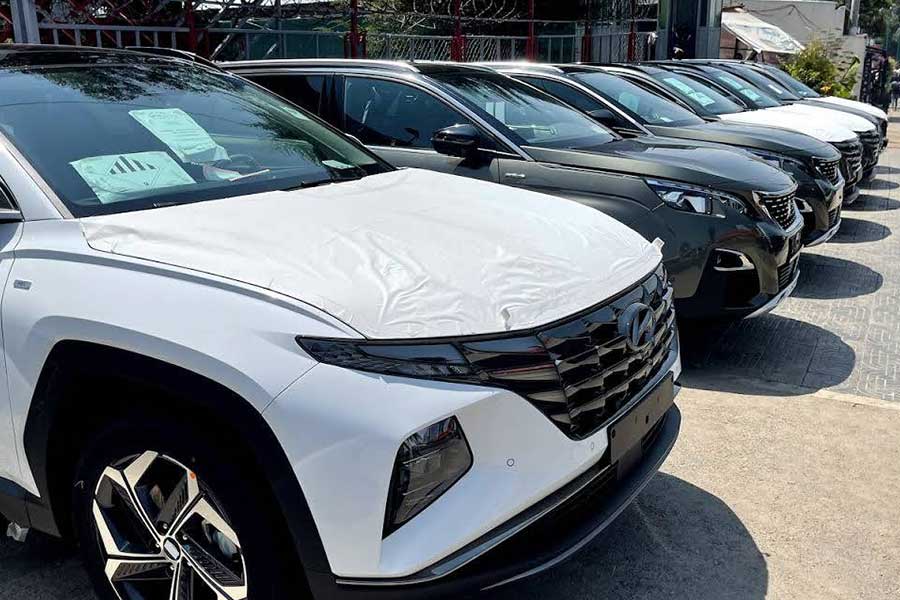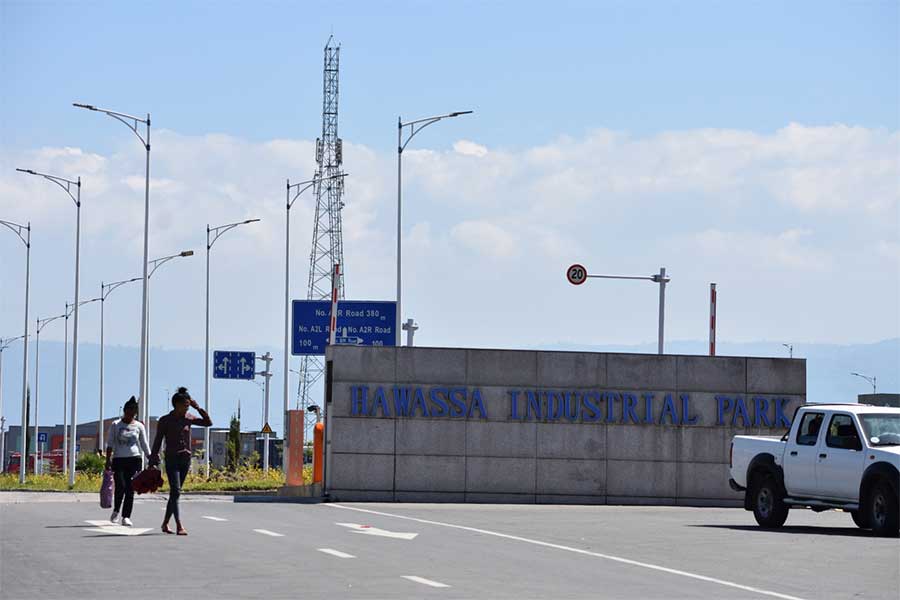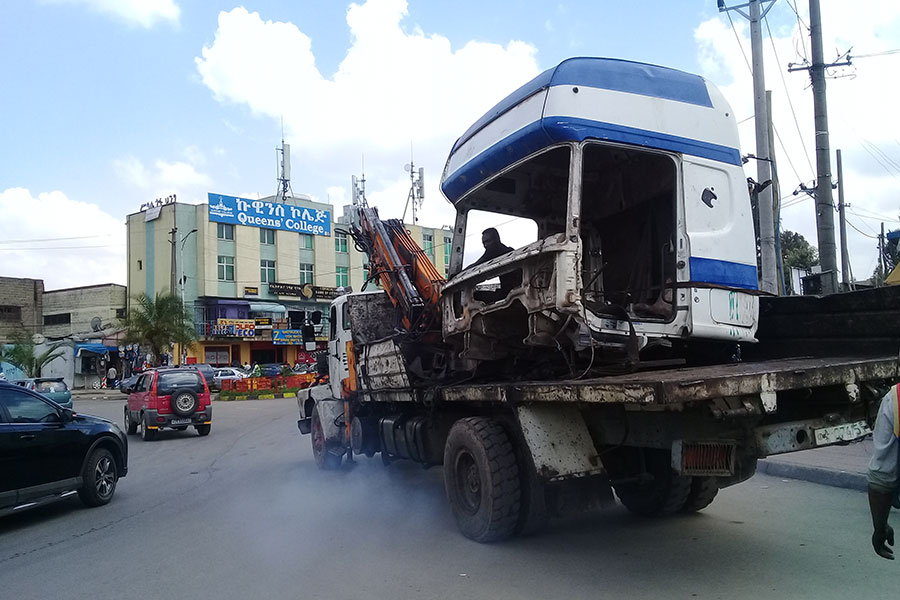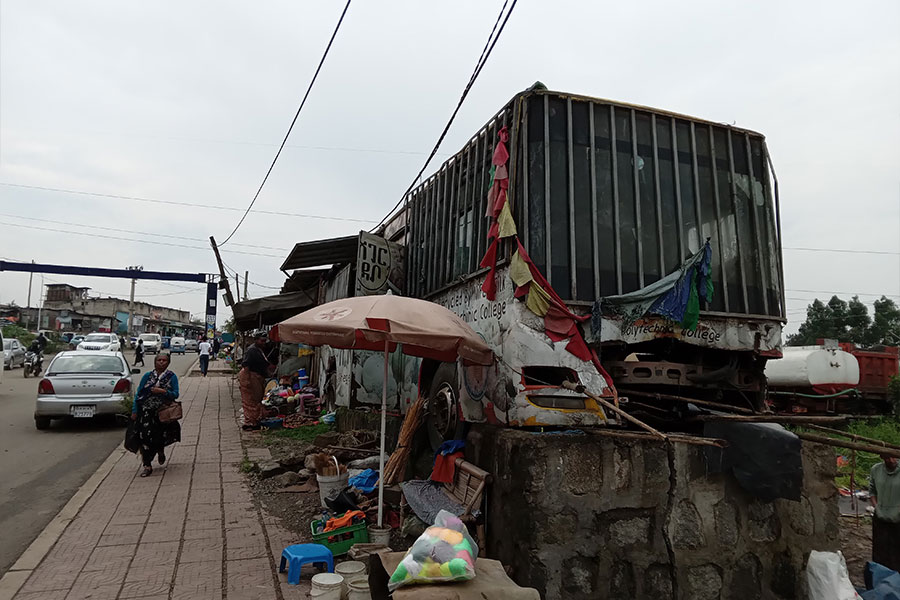
Agenda | Mar 06,2021
Yohannes Desalegn, a father of two, stares at his once-prized motorcycle. Five years ago, it symbolised a path to financial security through the delivery business. Now, it sits as a glaring reminder of a dream turning sour. Years of saving as a graphic designer yielded 58,000 Br, enough to purchase the motorbike and launch his entrepreneurial journey.
"I'm going to start sending my kids to public school," Yohannes told Fortune.
For a few years, the steady hum of the engine translated to success – a daily income of around 2,500 Br. But a cascade of restrictions by the transport authorities has choked that income stream. He is facing a harsh reality: 1,500 Br a week, barely enough to make ends meet.
"We are struggling," he sighs, the weight of his worries etched on his face.
The crackdown on Addis Abeba's motorcyclists has intensified. Frequent bans during high-profile events became a norm, with authorities recently restricting them from major roads during the African Union (AU) Summit and Adwa Victory celebrations. This follows concerns raised by the Addis Abeba Traffic Management Authority about a few of the nearly 20,000 motorcycles in the city being used for illegal activities. Former deputy mayor Takele Uma, enacted the first wave of bans back in 2019 after reports of lawlessness and burglary by pairs of individuals hitched on motorbikes proliferated.
Mulatu Mesfin, head of the regulatory control directorate at the Authority, cites motorcycle theft and robbery as major reasons for the mandatory installation of GPS devices.
"We wanted to track what they do," he said.
Mulatu is confident that the technology, supplied by 14 companies for an annual fee of 4,000 Br, has helped reduce crime rates. He indicated benefits to the bikers as they can weed out the thieves from the workers.
The mandatory GPS devices seem to be a point of contention as well. Wondwossen Ayele, general manager of Giza Trading, a company that has installed over 1,500 of these devices, blames both lax enforcement by authorities and rider tampering for their ineffectiveness. He explains that the devices could be disabled by unplugging them, removing the SIM cards, or even uninstalling them entirely.
Further efforts to improve safety and reduce accidents include the recent launch of digital licenses, a collaborative project between the Authority and the Addis Abeba Police Commission that integrates driver and vehicle data. A team of experts is expected to be deployed within the next two weeks to refine regulations for motorcyclists.
According to Mulatu, consultations with motorcycle associations took place before implementing these measures, addressing potential complaints about the cost of technology devices. With only half of the motorbikes in the capital sporting the devices, and riders known to tamper with them, the effectiveness of the program remains in question.
Frustration mounts among motorcycle associations like the Nifas Silk Laphto, which boasts 500 members. Their leader, Tadios Hailu, expresses the growing hardship caused by the string of bans and subsequent arrests, jeopardising their livelihoods. He points out a lack of proper communication recalling a recent instance where the three-day motorcycle ban was solely announced on social media and 18 members were arrested for trespassing.
"There's barely any word when a ban hits," he told Fortune.
Adding fuel to the fire is the financial strain. According to Tadios, the mandatory GPS devices come with an annual fee of 4,000 Br, a significant burden for riders already struggling with dwindling incomes due to the restrictions. He proposes a more targeted approach. Instead of blanket bans, Tadios suggests the authorities could identify association members through better communication, preventing unnecessary arrests.
"Even I wasn't informed the last time!" he said.
Frustration continues to simmer as another curveball was thrown at motorcyclists two months ago. They were restricted from major roads between Bole International Airport and Arat Kilo, adding to the uncertainty clouding their future.
Alazar Taye, head of the 392-member Addis Abeba Motorcycle Owners Association, was blindsided by the announcement. He foresees not only wasted fuel but also unnecessary complications for riders trying to navigate the city. He believes the city's roads have ample space to accommodate motorcyclists who rely on their two-wheeled vehicles for their livelihood. He's also been pleading with authorities to lift the ban on carrying passengers.
"We've written letters to the Authority," he told Fortune.
While the motorcycle associations fume, the authorities remain resolute. Kibebew Mideksa, head of the Authority, justifies the ban on major roads by citing the need for smooth traffic flow for "VIP guests." Signage has been placed to inform riders of the restriction and similar bans are planned for other congested roads overwhelmed by trucks and motorbikes, according to Kibebew.
Traffic congestion caused by motorcycles is often cited as the reason for holiday and event bans. The Addis Abeba Transport Bureau uses theft as the justification for the passenger ban. Worqu Desta, deputy head of service research, highlights the challenges posed by motorcyclists, referencing a four-year-old helmet and uniform directive that failed to curb crime.
"Crime rates only dropped after the passenger ban," he said.
Worqu reveals a concerning practice – some riders obscured their license plates with mud to evade identification during criminal activity. He claims the passenger ban, implemented after discussions with residents regarding rampant theft, has yielded positive results: only two motorcycle theft reports since the ban.
The Bureau seems to be laying the groundwork for a future without traditional motorbikes. Worqu emphasises that motorcycles do not fit into the Bureau's mass transport strategy. A pending directive, once approved, will bar any non-electric motorcycles from city roads.
"Until better technology arrives," he warns, "the bans will continue."
Out of the over 4,000 motorcyclists motorcyclists organised under nine associations, about 2,494 have transformed to delivery service after the ban.
The ripple effects of the motorcycle crackdown extend far beyond the riders themselves. Businesses dependent on delivery services are feeling the pinch. The popular Zmall app, known for its speedy deliveries through motorbikes, has seen its operations hobbled by the shrinking number of approved routes.
Yoseph Hailu, the marketing manager, reveals the harsh reality: they had to cut the contract with 10 restaurants in the last couple of months. While Zmall uses bicycles and cars as alternatives, customer satisfaction suffers.
"Car deliveries scare customers off," said Yoseph, citing concerns about delays and higher costs. Bike deliveries cost 65 Br compared to 115 Br for cars. This shift has impacted Zmall's earnings, forcing them to offer higher commissions up to a staggering 88pc splits to car drivers. The consequence? A wave of cancellations – roughly 80pc of bike orders are now abandoned, according to Yoseph.
Yosef outlines Zmall's strategy to navigate these challenges: optimising a combination of motorbikes and bicycles to meet delivery schedules while minimising costs. However, the uncertainty weighs heavily on riders like 23-year-old Eyob Fiseha. Eyob, who previously averaged 27 deliveries a day and earned enough to cover rent and support his family, worries about the future. Many of his customers frequent areas near restaurants, locations that often coincide with the newly banned routes.
"I don't know what's next," Eyob told Fortune, his voice laced with worry.
Addis Abeba City Administration's plan to phase out non-electric motorcycles. Experts propose alternative solutions, arguing that motorbikes, being agile and fuel-efficient, can be part of a well-managed transportation system.
Ashu Sentayehu, a transport consultant who has also worked in traffic management, propose alternative solutions. He argues that gradual measures, such as improved technology and better road infrastructure, would be more effective than outright bans.
Ashu emphasises that mass transport options, while capable of moving more passengers, are often bogged down by traffic jams, offering little advantage in reducing commute times. He contends that motorbikes, being agile and fuel-efficient, can be part of a well-managed transportation system.
"They can not seriously be considered as the cause of traffic congestion," Ashu told Fortune.
With livelihoods at stake and a lack of clear communication from authorities, the path forward seems fraught with tension. Finding a sustainable solution that balances public safety, traffic management, and the economic needs of riders, businesses, and authorities will be crucial.
PUBLISHED ON
Mar 09,2024 [ VOL
24 , NO
1245]

Agenda | Mar 06,2021

Fortune News | Dec 05,2020

Fortune News | May 31,2020

Fortune News | Jul 24,2021

Radar | May 06,2023

Fortune News | Jun 26,2021

Fortune News | Apr 12,2020

Radar | Jul 24,2023

Radar | Feb 04,2023

Addis Fortune | May 04,2024

Dec 22 , 2024 . By TIZITA SHEWAFERAW
Charged with transforming colossal state-owned enterprises into modern and competitiv...

Aug 18 , 2024 . By AKSAH ITALO
Although predictable Yonas Zerihun's job in the ride-hailing service is not immune to...

Jul 28 , 2024 . By TIZITA SHEWAFERAW
Unhabitual, perhaps too many, Samuel Gebreyohannes, 38, used to occasionally enjoy a couple of beers at breakfast. However, he recently swit...

Jul 13 , 2024 . By AKSAH ITALO
Investors who rely on tractors, trucks, and field vehicles for commuting, transporting commodities, and f...

Jun 28 , 2025
Meseret Damtie, the assertive auditor general, has never been shy about naming names...

Jun 21 , 2025
A well-worn adage says, “Budget is not destiny, but it is direction.” Examining t...

Jun 14 , 2025
Yet again, the Horn of Africa is bracing for trouble. A region already frayed by wars...

Jun 7 , 2025
Few promises shine brighter in Addis Abeba than the pledge of a roof for every family...